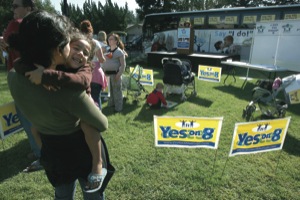national
Schools emerge as new tactic in same-sex marriage votes
Strategy seems to have worked in recent elections
Published Thursday, 12-Nov-2009 in issue 1142
\SAN FRANCISCO (AP) – In one ad after another, voters in California and Maine were besieged with images of what would supposedly happen if same-sex marriage were legal: Students on a field trip to a lesbian wedding, elementary kids gobbling up books featuring same-sex couples, kindergartners learning about homosexuality from their teachers.
The strategy worked. Overruling the courts and lawmakers, voters defeated same-sex marriage ballot measures in California last year and in Maine this week after conservatives convinced residents that same-sex unions would become common classroom fodder without any say from parents.
The punch-to-the gut claim has emerged as the latest tool in the ever-evolving playbook of same-sex marriage opponents, and the Achilles’ heel of the same-sex-marriage movement. Voters seem to be swayed by the notion that same-sex marriage will be a corrupting force among children, even though critics blasted the message as a blatantly misleading case of fear-mongering.
“It was very effective. It’s drawing on the fears of the unknown,” said Sandy Maisel, director of the Goldfarb Center for Public Affairs and Civic Engagement at Maine’s Colby College. “There’s no evidence that it’s going to happen, but there’s very clear evidence that it’s an effective campaign tactic.”
Same-sex marriage opponents discovered the effectiveness of the schools message in last year’s successful effort to pass Proposition 8 to outlaw same-sex marriage in California.
After signing up to lead the campaign, political consultants Frank Schubert and Jeff Flint knew they had a problem: Polls were showing that residents tended to not have much of a problem with same-sex relationships.
With the help of focus groups, surveys and ammunition unwittingly supplied by their opponents, Schubert and Flint soon found a new way to frame the issue, by focusing on education.
It was a departure from past elections when the issue was defined in simpler terms – that marriage is a sacred institution between a man and a woman. The various strategies have helped conservatives win 31 consecutive ballot initiatives on same-sex marriage.
“We bet the campaign on consequences, especially on education,” Schubert recalled in March when he and Flint were named the “public affairs team of the year” by the American Association of Political Consultants for their work in California. “Education from the beginning, while it was one of three consequences, it was the one that was the most emotionally charged and the most powerful.”
In California and Maine, same-sex marriage supporters countered the claims with spots featuring prominent elected officials – California’s chief of public instruction, Maine’s attorney general – who insisted that same-sex marriage had nothing to do with schools.
They also angrily denounced as deceptive the visuals the Sacramento team employed, including a Massachusetts couple who lost a lawsuit seeking parental consent before same-sex families are discussed in elementary classrooms.
But the response did not defuse the hot-button issue, advocates on both sides of the issue observe, in part because they failed to address what many parents knew to be true: Many public schools already have lessons that include references to same-sex families in the younger grades and confronting anti-same-sex discrimination for older students. Although the topics usually are broached in the context of appreciating diversity and tolerance, for some parents any discussion of same-sex people is too close to talking about same-sex sex.
Melissa Murray, an assistant professor at the UC Berkeley Boalt Hall School of Law who researched the messages used in the Proposition 8 campaign, said same-sex marriage advocates underestimated how deeply Schubert and Flint’s carefully crafted schools message resonated with the public.
One reason it resonated so deeply is it changed the debate from one of equal rights to the equally cherished notion of individual rights, something same-sex activists should keep in mind as the marriage moves to other states, Murray said.
|
|
Copyright © 2003-2025 Uptown Publications


